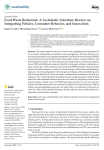Carvalho R., Lucas M.R., Marta-Costa A. (2025). Food waste reduction: a systematic literature review on integrating policies, consumer behavior, and innovation. Sustainability, 01/04/2025, vol. 17, n. 7, p. 3236.
https://doi.org/10.3390/su17073236
https://doi.org/10.3390/su17073236
| Titre : | Food waste reduction: a systematic literature review on integrating policies, consumer behavior, and innovation (2025) |
| Auteurs : | R. Carvalho ; M.R. Lucas ; A. Marta-Costa |
| Type de document : | Article |
| Dans : | Sustainability (vol. 17, n. 7, April 2025) |
| Article en page(s) : | p. 3236 |
| Langues : | Anglais |
| Langues du résumé : | Anglais |
| Catégories : |
Catégories principales 08 - ALIMENTATION ; 8.3 - Politique et Sécurité AlimentaireThésaurus IAMM DECHET ALIMENTAIRE ; POLITIQUE ALIMENTAIRE ; GASPILLAGE ALIMENTAIRE ; COMPORTEMENT DU CONSOMMATEUR ; SECURITE ALIMENTAIRE ; INNOVATION |
| Résumé : | This article addresses the issue of food waste, highlighting its implications for food security, sustainability, and global resource management. The main objective is to develop the principles for an Integrated Sustainable Food Waste Reduction System (IFWRS), a theoretical and practical framework that unites public policies, consumer behavior, and technological innovation. To achieve this goal, the study employs a systematic literature review (SLR) and bibliometric analysis to identify critical gaps, synthesize existing knowledge, and provide a solid foundation for the proposed IFWRS principles. These principles present actionable strategies to combat food waste through a holistic and multidisciplinary approach, overcoming fragmented methodologies and aligning with sustainability goals at both local and global levels. This work makes a fundamental contribution to the field, providing not only a robust theoretical foundation but also a practical guide for implementing innovative and sustainable solutions across the food chain. By integrating various sectors and promoting a unified vision, the IFWRS principles pave the way for more effective policies and interventions that can transform the global food waste landscape. With its unique and groundbreaking approach, this study offers a revolutionary perspective to solve one of the world?s greatest challenges, driving collective action and the adoption of sustainable, transformative strategies. |
| Cote : | En ligne |
| URL / DOI : | https://doi.org/10.3390/su17073236 |







